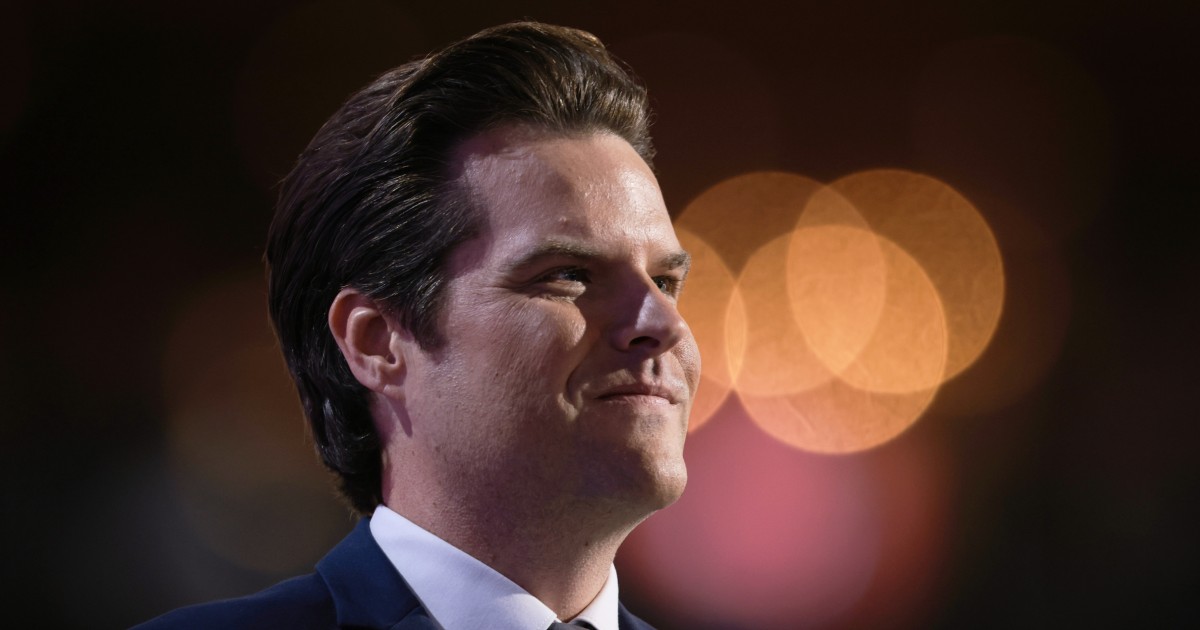
‘Disaster Dodged’: Gaetz's Meltdown Draws Relief and Envy
Posted on 11/25/2024

This article is part of The D.C. Brief, TIME’s politics newsletter. Sign up here to get stories like this sent to your inbox.
As word ricochetted around Washington last week that Donald Trump’s pick to lead the Department of Justice was pulling his name amid untenable scrutiny of a dating life alleged to include minors, drugs, and cash, nowhere were the sighs of relief louder than from the DOJ staffers themselves.
` “Disaster dodged,” one career prosecutor texted me in the hours that followed Gaetz’s professed self-decided exit. “How did we get so lucky?” another asked. “Maybe the Republic endures,” a former prosecutor messaged.
Around the capital, the DOJ cohort’s colleagues were all hoping they’d be given a similar spate of history-defying good luck. With Trump on course to return to Washington with his own raft of yes-men ready to stack the Cabinet-in-waiting, 4.5 million federal workers are bracing themselves for a cultural shift unlike any they’ve seen before—even starker and faster than when Trump first came to Washington eight years ago. Then, many argue, Trump had twin guardrails keeping him in line: he didn’t fully understand just how much power an unchecked presidency can wield, and the folks he surrounded himself with were largely normie CEOs who placated the boss, but often only to a point. This time, he has a better understanding of the potential and is choosing his deputies from a casting couch of made-for-TV underlings who share his agenda of retribution and retaliation.
Trump is amassing what may be the most inexperienced Cabinet in decades, one with more skeletons afoot than a cemetery and dodgy odds of getting through en masse. Potential nominees are bypassing the traditional FBI background checks and instead are being plucked from flatscreen televisions cued up with clips of candidates’ cable news hits. Specific knowledge or skills are secondary to the vibe Trump gets from them, and how well they play on Fox News.
Just witness Matt Gaetz as his first—and fast-failed—pick to become Attorney General. The now former Congressman has limited legal experience, and none running a large organization. Making matters much worse, the Florida Republican was investigated by the department he was tapped to lead, an ethics panel report was due to be released about myriad instances of his relationships with teens, and even his most MAGA colleagues saw trouble on the horizon for that nomination. In a stunning eight days, Gaetz went from Congressman to fast-rising Cabinet nominee to disgraced both. Replacing him, at least for now, is Pam Bondi, a former Florida Attorney General who is simultaneously a Trump apologist and election-fraud flirt, but seen as less of an altogether burn-it-down pick.
For remaining nominees, in particular Pete Hegseth, Tulsi Gabbard, and Robert F. Kennedy Jr., the legitimate questions about skills and temperament are not going away. The withdrawal of Gaetz isn’t easing the compounding frustrations among Senate Republicans, as Trump keeps daring them to do anything but accept the outrageous team he’s assembling.
It’s not just about the top gigs, either. Trump and his allies are poised to install MAGA loyalists further down the ladder, making it all the easier to implement massive changes at all levels, starting with a widely expected mandatory return-to-office policy that could cull the headcount on its own. (That is, in fact, the point of the shift that is not entirely considered in context of where, actually, the feds do their jobs.) Allies have loaned their support to the move, suggesting that it might have a broad backing that could soon creep into private employers, too. Put simply: Trump is happy to show scores of feds the door if they’ve grown too comfortable with remote work.
Federal employees—who make up the single biggest pot of workers under one system in this country—are largely at the mercy of their incoming CEO, who has been open in his contempt of the career corps he considers a disloyal or even traitorous Deep State. The new crop of lieutenants is set to enforce Trump’s whims.
For now, it seems, DOJ lifers were spared having to work under the command of a complete neophyte whose main talents were staying in Trump’s good graces. Their colleagues across government may not get a similar break.
As word ricochetted around Washington last week that Donald Trump’s pick to lead the Department of Justice was pulling his name amid untenable scrutiny of a dating life alleged to include minors, drugs, and cash, nowhere were the sighs of relief louder than from the DOJ staffers themselves.
` “Disaster dodged,” one career prosecutor texted me in the hours that followed Gaetz’s professed self-decided exit. “How did we get so lucky?” another asked. “Maybe the Republic endures,” a former prosecutor messaged.
Around the capital, the DOJ cohort’s colleagues were all hoping they’d be given a similar spate of history-defying good luck. With Trump on course to return to Washington with his own raft of yes-men ready to stack the Cabinet-in-waiting, 4.5 million federal workers are bracing themselves for a cultural shift unlike any they’ve seen before—even starker and faster than when Trump first came to Washington eight years ago. Then, many argue, Trump had twin guardrails keeping him in line: he didn’t fully understand just how much power an unchecked presidency can wield, and the folks he surrounded himself with were largely normie CEOs who placated the boss, but often only to a point. This time, he has a better understanding of the potential and is choosing his deputies from a casting couch of made-for-TV underlings who share his agenda of retribution and retaliation.
Trump is amassing what may be the most inexperienced Cabinet in decades, one with more skeletons afoot than a cemetery and dodgy odds of getting through en masse. Potential nominees are bypassing the traditional FBI background checks and instead are being plucked from flatscreen televisions cued up with clips of candidates’ cable news hits. Specific knowledge or skills are secondary to the vibe Trump gets from them, and how well they play on Fox News.
Just witness Matt Gaetz as his first—and fast-failed—pick to become Attorney General. The now former Congressman has limited legal experience, and none running a large organization. Making matters much worse, the Florida Republican was investigated by the department he was tapped to lead, an ethics panel report was due to be released about myriad instances of his relationships with teens, and even his most MAGA colleagues saw trouble on the horizon for that nomination. In a stunning eight days, Gaetz went from Congressman to fast-rising Cabinet nominee to disgraced both. Replacing him, at least for now, is Pam Bondi, a former Florida Attorney General who is simultaneously a Trump apologist and election-fraud flirt, but seen as less of an altogether burn-it-down pick.
For remaining nominees, in particular Pete Hegseth, Tulsi Gabbard, and Robert F. Kennedy Jr., the legitimate questions about skills and temperament are not going away. The withdrawal of Gaetz isn’t easing the compounding frustrations among Senate Republicans, as Trump keeps daring them to do anything but accept the outrageous team he’s assembling.
It’s not just about the top gigs, either. Trump and his allies are poised to install MAGA loyalists further down the ladder, making it all the easier to implement massive changes at all levels, starting with a widely expected mandatory return-to-office policy that could cull the headcount on its own. (That is, in fact, the point of the shift that is not entirely considered in context of where, actually, the feds do their jobs.) Allies have loaned their support to the move, suggesting that it might have a broad backing that could soon creep into private employers, too. Put simply: Trump is happy to show scores of feds the door if they’ve grown too comfortable with remote work.
Federal employees—who make up the single biggest pot of workers under one system in this country—are largely at the mercy of their incoming CEO, who has been open in his contempt of the career corps he considers a disloyal or even traitorous Deep State. The new crop of lieutenants is set to enforce Trump’s whims.
For now, it seems, DOJ lifers were spared having to work under the command of a complete neophyte whose main talents were staying in Trump’s good graces. Their colleagues across government may not get a similar break.
Comments( 0 )
0 0 4























